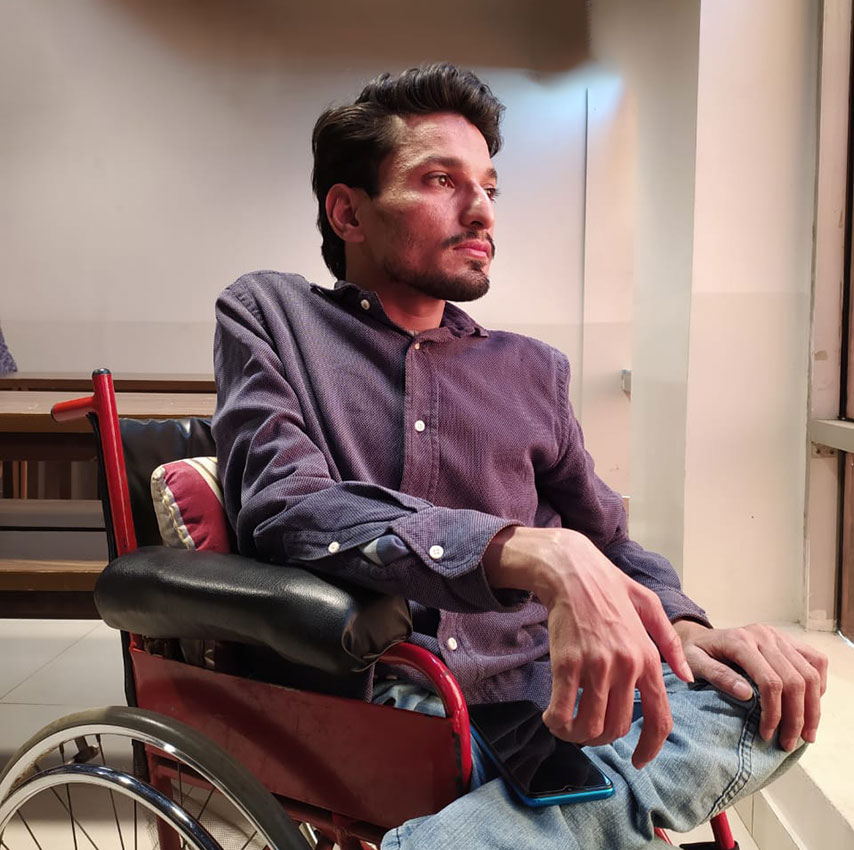
Adeel Ahmed: The Disability Expert Redefining Inclusion in Karachi, Pakistan
In the complex landscape of disability advocacy and rights in Pakistan, the term ‘expert’ often refers to policymakers or NGO leaders. However, Adeel Ahmed, a polio survivor from Karachi, has redefined this expertise. Adeel’s authority stems not only from his academic background (Master’s in Economics and a Computer Sciences degree) and his lived experience but, crucially, from his role as an innovator and entrepreneur who builds tangible solutions. He is a hands-on Disability Expert in Karachi, Pakistan, whose work with Revamp House and Eye Interaction demonstrates a profound understanding of the technical, economic, and social dimensions of true inclusion.
The Expertise of Lived Experience: More Than Just Advocacy
Adeel Ahmed’s expertise is uniquely calibrated by his journey as a polio survivor navigating a severely inaccessible world. This personal context allows him to move beyond theoretical debates to address the immediate, practical hurdles faced by Persons with Disabilities (PWDs).
Expertise Pillars:
- Technical Accessibility: His background as a Computer Sciences graduate and the co-founder of Eye Interaction provides specialized knowledge in creating assistive technology and automated solutions. This is an area where Pakistan severely lacks local expertise.
- Socio-Economic Inclusion: Through his educational journey and professional career, Adeel gained deep insights into the economic barriers—specifically unemployment and dependence—that plague the PWD community. His economic degree informs his business model at Revamp House.
- Policy and Awareness: His extensive work as a disabled motivational speaker in Karachi and his media interviews demonstrate expertise in communicating the complex issues of disability rights to diverse audiences, from the common person to corporate CEOs and government officials.
Adeel’s message is clear: true disability expertise requires the ability to diagnose the problem (lack of accessibility, stigma), design the solution (technology, inclusive employment models), and implement the change (Revamp House).
Pioneering Technical Solutions: The Eye Interaction Model
A defining aspect of Adeel Ahmed’s expertise is his contribution to locally developed assistive technology. Recognizing that imported solutions are often expensive and impractical for the majority of Pakistan’s PWD population, Adeel co-founded the startup Eye Interaction.
Innovation in Action:
- Home Automation Systems: The startup focused on developing systems that allow physically challenged individuals to control household appliances (lights, fans) using a mobile application or, for those with severe mobility issues, eye movements. This technology addresses a fundamental, often overlooked aspect of independence: control over one’s immediate living environment.
- Customized Mobility: Eye Interaction’s customized electric wheelchairs, operable through a mobile interface, provide a critical mobility solution in a city like Karachi, where public transport and sidewalks are hostile to manual wheelchairs.
Adeel’s role as the Research Analyst in this venture underscores his technical proficiency and his expert focus on Human-Centered Design. This approach ensures that the technology is not just functional but genuinely meets the psychological and physical needs of the end-user a hallmark of true disability expertise.
Economic Expertise: The Revamp House Model for Sustainable Livelihoods
As a Disability Expert in Karachi, Pakistan, Adeel recognized that the most sustainable solution to exclusion is economic empowerment, not perpetual dependence on charity. This insight led to the creation of Revamp House, an enterprise designed to counter the debilitating 70%+ unemployment rate among PWDs.
The Revamp House strategy is built on Disability Sustainable Living through skill monetization:
| Component | Description | Expert Rationale |
| High-Demand Skill Training | Focuses exclusively on digital skills (web design, graphic design, SEO, coding) that eliminate physical location as a barrier. | Technical Expertise: Leverages the global, decentralized nature of the IT industry, matching the team’s skills to high-value market demand. |
| Integrated Employment Model | The organization functions as a business where PWDs are paid employees, executing client projects. | Economic Expertise: Demonstrates that inclusion is profitable. It converts the “disabled person” narrative from a welfare case into a skilled contributor to the national GDP. |
| The “Great Team” Concept | Adeel deliberately markets his team as a high-performing unit of disabled persons, leveraging the narrative for positive brand recognition. | Social Expertise: Actively combats stigma by associating disability with high skill, professionalism, and reliability, challenging corporate bias at its root. |
Adeel’s role here is that of a social engineer and CEO, using business acumen to solve a profound social problem, a characteristic of a modern disability expert.
Shaping the Public Discourse and Policy Landscape
Adeel Ahmed’s influence extends far into the public and political sphere. He uses his platform not only as a disabled person motivational speaker but as a Disability Expert advocating for legislative and infrastructural change.
Areas of Influence:
- Critique of Legislation: Adeel frequently highlights the gaps in the existing Disabled Persons (Employment and Rehabilitation) Ordinance, 1981, and the weak enforcement of the 2% job quota. His critique is grounded in the practical difficulties of finding a job, providing expert testimony to the failure of top-down policies.
- Awareness on Polio Eradication: As a polio survivor, he is an outspoken advocate in the polio eradication campaign, using his own life as a stark example of the disease’s consequences. This gives him an expert voice in public health campaigns aimed at raising awareness among health authorities and parents.
- Promoting Universal Design: Adeel’s advocacy consistently pressures urban planners and business owners in Karachi to adopt universal design principles. He argues that the physical barriers in the city are a failure of design, not a burden of the disabled community. His solutions—like the eye-controlled automation—are practical demonstrations of how modern design can solve age-old access issues.
By fusing his personal narrative with actionable technical and economic solutions, Adeel Ahmed stands as a transformative figure. He is not just talking about disability; he is actively leading a great team of disabled persons to revamp the entire concept of inclusion and self-reliance, proving his immense value as a leading Disability Expert in Karachi, Pakistan.
